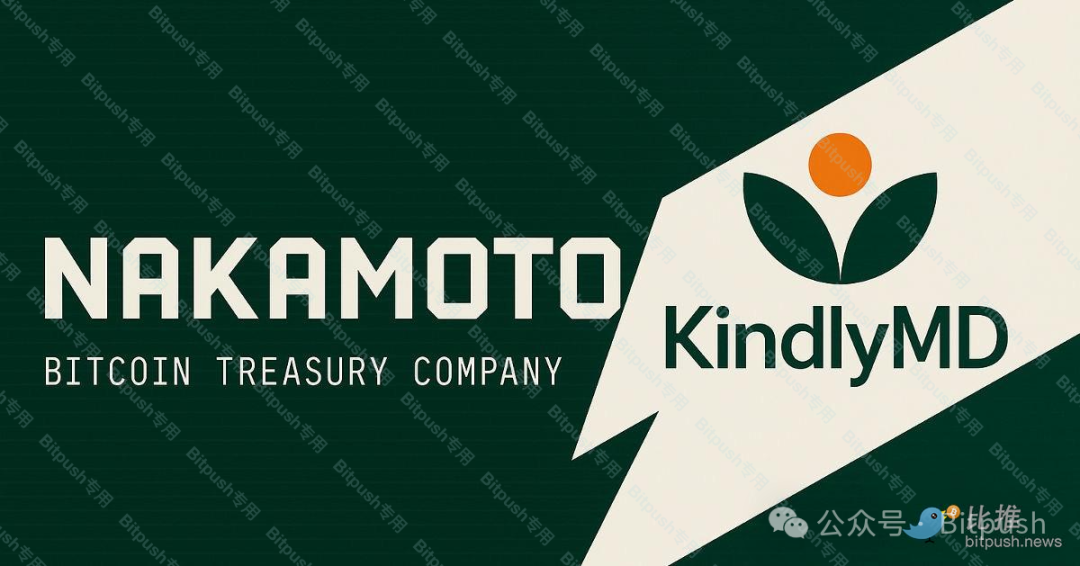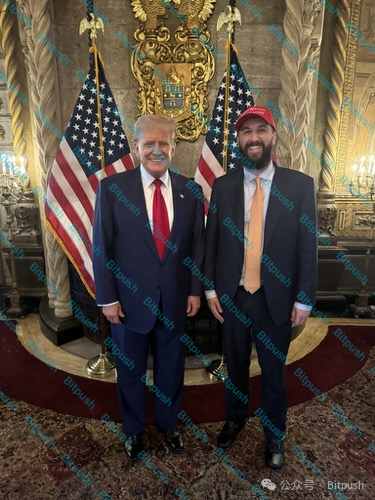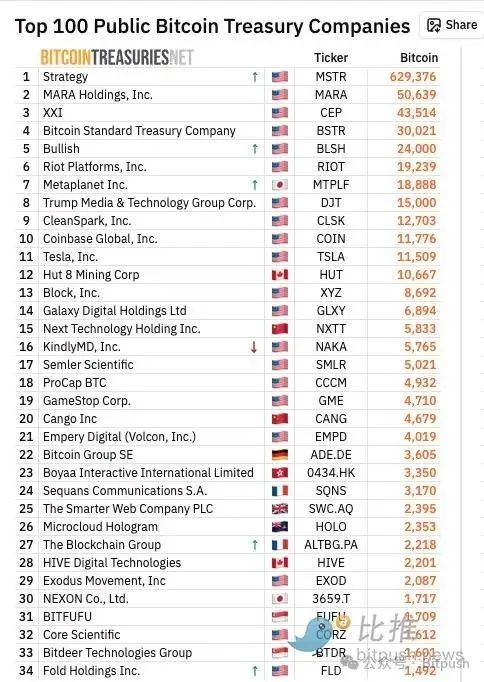In Salt Lake City, Utah, KindlyMD was originally a clinic network focused on treating opioid dependence. Founder and CEO Tim Pickett has repeatedly emphasized, "We don't just treat illness; we help patients rebuild their lives." In the U.S. healthcare system, KindlyMD gained attention for its "holistic healthcare" model.

However, in August 2025, a piece of news brought this company into the global spotlight of crypto finance: KindlyMD completed a merger with Nakamoto Holdings, officially transforming into a Bitcoin treasury company. After the merger, the stock code changed to NAKA, and it immediately announced the purchase of 5,744 Bitcoins, spending approximately $679 million.
Overnight, this relatively well-known medical company became a new giant in the Bitcoin capital market.
David Bailey: Bitcoin Evangelist and Trump "Advisor"
Driving this transformation is David Bailey.

He is the CEO of Bitcoin Magazine, long active in Bitcoin industry conferences and initiatives, and is regarded as one of the early evangelists of "Bitcoin treasuryization."
In 2023, he founded Nakamoto Holdings, a company with no complex products or cumbersome operations, only one goal: to buy as much Bitcoin as possible with capital.
Bailey describes it as "the Bitcoin treasury project."
During the 2024 U.S. presidential election, Bailey served as an external advisor, providing policy-level advice and communication to Trump's campaign team on issues related to digital assets and Bitcoin.
He is widely regarded as one of the key figures in Trump's shift from a crypto skeptic to a Bitcoin supporter. It was he who proposed the strategic idea of using crypto assets as policy leverage and public asset reserves, thereby influencing Trump's stance and policy direction.

At last year's Bitcoin conference, Trump publicly stated, "Dave, you did a great job," expressing his recognition of Bailey.
According to CNBC, sources revealed that he visited the White House at least six times. Bailey himself publicly stated, "The president has fulfilled his commitment to the Bitcoin industry, and I will always be grateful for that."
Notably, in the advisory board of Japan's "MicroStrategy" company Metaplanet, Bailey is a member alongside Eric Trump (Trump's second son). This creates a subtle resonance between the strategies of KindlyMD/NAKA and the Trump family's layout in crypto finance.
PIPE + Convertible Bonds: Capital Magic
In the summer of 2025, Bailey found his "listing vehicle"—KindlyMD.
The transformation of KindlyMD was not a simple shell change. Through a complex capital operation, Bailey prepared ample ammunition for NAKA:
PIPE financing of $540 million, with an issue price of $1.12 per share;
Convertible bonds of $200 million, zero interest for the first two years, 6% interest starting in the third year, with a conversion price of $2.80.
Bailey stated in a CNBC interview, "I can raise $100 million almost every day, sometimes even $200 million."
This financing received support from over 200 investors, including Actai Ventures, Arrington Capital, BSQ Capital Partners, Kingsway, Van Eck, and Yorkville Advisors.
The investor list for NAKA is almost a "Bitcoin Hall of Fame":
- Adam Back: Inventor of Hashcash, CEO of Blockstream.
- Balaji Srinivasan: Former CTO of Coinbase, former partner at a16z.
- Jihan Wu: Co-founder of Bitmain.
- Ricardo Salinas: Mexican billionaire, staunch BTC believer.
- Eric Semler: Wall Street veteran, Chairman of Semler Scientific.
- Simon Gerovich: CEO of Metaplanet, promoting Japanese listed companies to become "Asia's MicroStrategy."
Type
Description
Institutional Investors
Actai Ventures, Arrington Capital, BSQ Capital, Kingsway, Off The Chain, ParaFi, RK Capital, Van Eck, Yorkville Advisors (through YA II PN, Ltd.)
Individual Investors
Adam Back, Balaji Srinivasan, Danny Yang, Eric Semler, Jihan Wu, Ricardo Salinas, Simon Gerovich
Financing Method
PIPE (~$510M), Convertible Bonds ($200M), totaling approximately $710M
Quick Financing
June PIPE $51.5M, completed in just 72 hours
These names represent the capital power of the global Bitcoin industry. From Wall Street to Asia, from mining machines to exchanges, NAKA has assembled a global Bitcoin power map.
With the backing of capital, NAKA made its "whale debut": purchasing 5,764.91 Bitcoins at an average price of $118,204 each, directly entering the top twenty corporate Bitcoin holders globally.

Strategy²?
To understand NAKA's strategy, it must be viewed in the context of Strategy (formerly MicroStrategy).
Strategy: Since 2020, founder Michael Saylor has converted the company's cash into Bitcoin, currently holding 629,376 BTC, valued at over $72 billion. It has completely transformed into a "Bitcoin proxy stock," with its market value deeply tied to Bitcoin's price movements.
NAKA: Currently holds only 5,765 BTC, equivalent to 0.9% of MicroStrategy's holdings.
But Bailey's goal is more aggressive: to establish a network of Bitcoin treasury companies in the global capital market, ultimately holding 1 million BTC, accounting for nearly 5% of Bitcoin's total supply.
If MicroStrategy is the "pioneer," then NAKA is "Strategy²."
But the market is always harsh.
NAKA bought in at an average price of $118,204, and as of August 19, when this article was published, Bitcoin had dropped to about $112,757, resulting in a paper loss of approximately $31.39 million for NAKA, which is not significant, only 4% of the total investment. However, it reveals the inherent risk of the Bitcoin treasury model: stock prices and corporate value are almost entirely tied to Bitcoin prices.
Nonetheless, this is a long-term strategic game aimed at a million BTC reserve, where short-term fluctuations may actually provide better entry opportunities.
According to data from bitcointreasuries.net, there are currently 168 publicly traded companies holding Bitcoin, totaling over 983,000 BTC, close to 5% of Bitcoin's total supply.
In addition to MicroStrategy and NAKA, a new player is also drawing market attention—Twenty One. It was co-founded by Tether, Bitfinex, Cantor Fitzgerald, and SoftBank, initially holding 43,500 BTC, valued at nearly $5 billion at current market prices. Although it has not yet officially traded, its consortium background indicates that the Bitcoin treasury model is transitioning from "single company bets" to a stage driven by cross-industry consortium collaboration.
As capital giants begin to view Bitcoin as a core allocation on their balance sheets, the market's pricing power is quietly shifting away from retail investors towards institutional alliances that control financing, investment banking tools, and multinational resources.
Is this the beginning of a new chapter in financial history, or a re-enactment of an old narrative?
Regardless of the answer, history will remember this moment: a medical company transformed into a Bitcoin whale. Behind it, what truly influences the future price curve of Bitcoin is no longer the emotions of retail investors, but the patience and ambition of institutional capital.
免责声明:本文章仅代表作者个人观点,不代表本平台的立场和观点。本文章仅供信息分享,不构成对任何人的任何投资建议。用户与作者之间的任何争议,与本平台无关。如网页中刊载的文章或图片涉及侵权,请提供相关的权利证明和身份证明发送邮件到support@aicoin.com,本平台相关工作人员将会进行核查。




